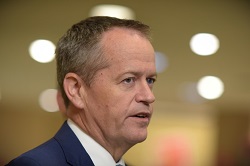Labor says its goal is to reduce Australia’s net greenhouse gas emissions to zero by 2050. Labor is also beginning consultations on an interim goal of reducing emissions by 45 per cent by 2030.
Predictably, this has started a war of words. Turnbull
- dismissed Opposition Leader Bill Shorten’s proposed reduction target of 45 per cent as a “heroic offer” and far too costly, saying it was “way out of line with other comparable countries”.
Pyne said the policy was “mad”, “smashing household budget costs and costing jobs and growth”. Morrison said it was a tax on growth and a “growth stultifier initiative”.
You can read what Greg Hunt said here. I find it hard to make any sense of what he says.
Shorten says it would be mad not to properly address climate change. Sophie Vorrath’s story takes up some of the points:
- Labor’s emissions commitment, based on a 2005 base year, goes beyond promises from Japan (25 per cent) and exceeds the US (41 per cent) and Europe (34 per cent).
And:
- Modelling done for the government by leading economist Warwick McKibbin compared a 26 per cent, 35 per cent and 45 per cent reduction target with the costs of doing nothing beyond 2020.
It showed the 26 per cent target would shave between 0.2 and 0.4 per cent from Australia’s gross domestic product in 2030; a 35 per cent target would cut 0.3 to 0.5 per cent, and a 45 per cent target would cut between 0.5 and 0.7 per cent.
Anita Talberg at The Conversation points out that Labor has chosen the weakest edge of the Climate Change Authority’s range, which, translated to a 2005 base would have been around -44% to -63% on 2005 levels.
Talberg also finds that if all the world did as well as Labor proposes, then we would have a 67% chance of staying within two degrees, which, of course, I think is folly.
Turnbull says that the policy is unrealistic and will not be met, so it’s a political rather than an environmental statement.
It’s true that Labor is now only starting consultations on what its target might be. Mark Butler:
- We want to go out over the next few months and by the end of March have had a very deep discussion with business, with unions and other stakeholders about the achievability of that target in the light of the Paris conference – which we think is very likely to be a successful conference – and a range of other domestic factors like the impact on jobs, particular regions and households.
But as a political statement as Turnbull flies off to Paris, Max Chalmers at New Matilda says Shorten is trying to wedge Turnbull against his own doubters in the Liberal/National party room.
- Given Turnbull’s long-held criticisms of his party’s current approach to climate action, it’s also a fair point for Shorten to make.
“I get that there are some people who just can’t work out the evidence,” Shorten said. “But what do we say about someone who has worked out the evidence and still refuses to act? This is selling out the future of the people of Australia, to placate the right wing of the Liberal party.”
You get the impression that on some level Malcolm Turnbull must know that’s true.
Elsewhere the Greens have announced a policy to move the country towards 90 per cent renewable energy by 2030.


The LNP Government have confirmed today that they will revisit their targets in 2017, after the next election.
It is also still policy to do away with ARENA.
The Nationals have been exercised over the possibility of signing a communique in Paris that would seek to dump the diesel fuel rebate to farmers and miners.
Well, no and yes.
A rebate is not a subsidy so it can’t ” cost ” the budget anything.
The Nats are spot on.
I should add it’s a rebate from a tax on road use that farmers, miners, fishermen or even a diesel powered airline ( if there were such a thing ) don’t even use, so it is fair and just this way.
As soon as they employ road transport, that tax is incurred, added to their cost of production and finally paid by the consumer, YOU.
I was just sharing information, Jumpy, not adopting a POV. In principle I’m happy with not taxing business inputs.
However, in the case of burning diesel it costs the climate, and that means everyone. Sooner or later that has to change or be offset.
The ABC have done a fact check of this claim:
The ABC found that that comparing emissions reductions between countries was very subjective, but Mr Turnbull’s claim was arguable.
Warwick McKibbin in today’s AFR has said that Labor’s targets could mean a carbon price of $200 per tonne. He says that both Labor and the LNP are probably relying on cheap international carbon credits.